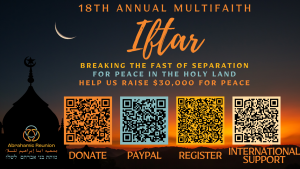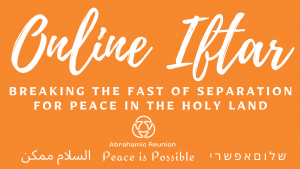The Abrahamic Reunion Peacemakers would like to offer messages of peace during Passover and Easter Season 2017 – from Rabbi Yakov Nagen, Father Nael Aburahmoun, and Sheikh Khalid Abu Ras.
Passover message from Rabbi Nagen
The Passover Hagada – The wise son returns to the questions
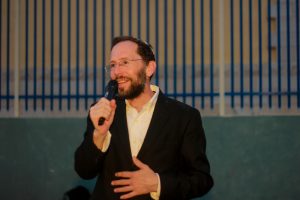 by Rabbi Yakov Nagen, AR Board Co-Chairman
by Rabbi Yakov Nagen, AR Board Co-Chairman
“The Torah speaks of four children: One is wise, one is wicked, one is simple and one does not know how to ask.” The Haggada
The four children represent four different types of personalities. Because life is dynamic, each person, during the course of his or her lifetime, often incorporates aspects of all four of these personalities. The transformation between the different identities may be confusing and frustrating, especially when it is from a “positive” personality, to one which is considered “negative”. This is why it is important to understand that each of the four personalities mentioned in the Hagada reflect four stages of spiritual searching. Sometimes, a person has to pass through each of them. This idea may help guide us through life’s journey.
“He who does not know how to ask…”
Asking questions is the basis for growth. One who asks questions gets a chance to see the world from a new point of view, and is willing to learn and change. This motivates him to search and discover. Without the ability to ask, a person remains stagnant in the same place and at the same level. He is aware only of the familiar, and the rest of the world remains a sealed book. The Mishna opens the discussion about the mitzvah of telling the story of the redemption during the seder by describing “… and here the son asks his father, and if the son has insufficient understanding, his father instructs him…” (Pesachim 10, 4) What does the father teach his son? We would think that he tells him the story of the exodus from Egypt. Instead the mishna continues with a list of questions: “Wherefore is this night different from all other nights…?” In other words, the father’s job is to teach his son how to ask!1
“He who is simple…”
The simple one knows how to ask. However, because of his great simplicity, he is ready to accept simple answers. These simple answers are at times caused by the limited knowledge of the responder, and often, by that of the asker “…and according to the knowledge of the child, the father instructs him…” (Ibid) Either way, the answers that the simple son gets are all banal, and don’t deal with the depth and complexity of the questions. Nonetheless, this is why he lives in a harmonious world where everything is orderly and understood. At first glance, there is charm and grace in this naïve life, but it is only an illusion. The world and the reality is complex, and one day the child will grow up and realize that not everything is so simple.
“He who is wicked…”
The possibility that questions can be more convincing than the answers can cause a crisis. The wicked son feels cheated. He is upset at all those who have been feeding him lies, and despises those who still believe the answers, which seem to him shallow and unsatisfactory — if not fake. He loses trust in the society wherein he was raised, isolates himself, and refuses to accept anything from those who disappointed him. When he was more naïve, he believed everything, and now he does not believe in anything. That is the tragic process of the wicked son in the Hagada. He is no longer interested in the search, and his questions are for defiant purposes only. “The Wicked Son, what does he say? ‘What is this service to you ?’ To you, but not to him. Since he has excluded himself from the community, he has denied himself the essentials of our faith.” (The Hagada)The denial of faith begins by stepping out of the question and answer dialogue, which is so essential for the continuation of Jewish life.
“He who is wise…”
The difference between the three previous sons and the wise son is that none of the above tries to view the world through spectacles of questioning and searching. The first son does not know how to ask, the second son thinks that all of his questions have been answered, and the third son thinks that his questions have no answer — so there is no point in asking and searching. As opposed to them, the wise son returns to the questions. He is willing to return and re-ask the questions.
Where did this ability to start over come from? Just like the wicked son, the wise son understands the complexity of reality, but this comprehension leads him to opposite conclusions. The world is complex and the expectation for perfect answers has never been anything but an illusion. The answers are limited because of the nature of the world, so the responders cannot be blamed and looked down upon. The wise son understands that just because adults, including his parents, do not know everything — does not mean that they do not know anything. In fact, there is much to learn from the people that he used to degrade. As Mark Twain put it, “When I was fifteen, I discovered that my dad was dumb. When I was twenty, I was amazed by how much the ‘old man’ learned in the last five years.”
The world is complicated and full of contradictions, and for this reason, even if the person feels that not everything he used to believe in is true, it doesn’t mean it is a lie. The easiest way out is to dump everything. It is much harder to look for the little bits of light and truth that are hidden in everything and everyone, which make it all meaningful.
The wise son of the Hagada did not get his name from his sharp answers, but because of the questions he asks. He is the only one out of the four sons who knows that he does not know. He approaches the world with modesty. A world that is so beautiful because of all the secrets it conceals. The wise son hears God cry “Seek for me always,” and knows that the search is the meaning of life. He returns to the naiveté that is mentioned in the Hassidic saying, “Innocence is greater than wisdom, but how wise does a person have to be, to become innocent.”
Easter & Passover Blessings from Fr Nael Abu Rahmoun
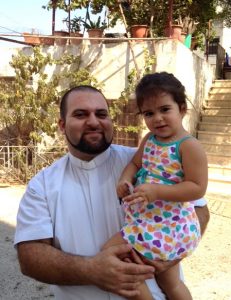 Salaam Shalom Peace and greetings to everyone from Nazareth,
Salaam Shalom Peace and greetings to everyone from Nazareth,
Passover is a call to remember the crossing of the people of God from slavery to freedom.
Easter is a call to remember the passing of Jesus Christ from death to life.
So we are then reminded that Life, Joy, liberty, Reconciliation, Justice and Peace will have the last word.
In these days we continually hear bad news of violence and wars and racism against humanity, but celebrating these feasts we will renew our faith in God and hope to a better life and future.
It is time for religions and spiritual leaders to contribute more than ever in peace building… Easter Blessings to you
Christ is risen He is risen indeed… Alleluia
المسيح قام حقا قام هللويا
Happy Passover Feast חג פסח שמח
Fr. Nael Abu Rahmoun
Anglican Priest
Christ Church Nazareth
Passover Blessings from Sheikh Khalid Abu Ras
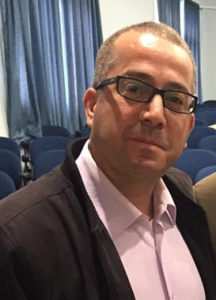 Al-Salamu Alaykum , Shalom
Al-Salamu Alaykum , Shalom
Wishing you joy and many blessings Passover and throughout the year.
Passover is a Jewish festival celebrated in commemoration of the release of the Hebrews from the brutal slavery of the ancient Egyptians.
ALLAH God bless you and our world, and give us to recognize this
Experience.
you always be blessed with peace and happiness.
Wishing you and our world a Happy Passover.
Chag Sameach.
Love you
Khalid
Easter & Passover Blessings from Shahabuddin David Less
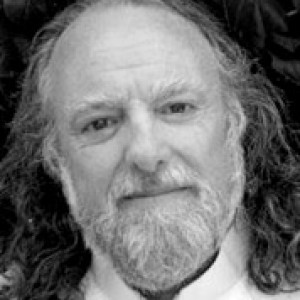 Each of the religions of Beni Israel have developed out of the breast of the prophet Abraham. His message was clearly to appreciate the wisdom and love of the one G*d, the G*d of and in all peoples, and to worship G*d by loving the creation of that infinite being. As we love each other and as we love nature we are worshiping the truth and wisdom of Abraham, Sarah, and Hagar.
Each of the religions of Beni Israel have developed out of the breast of the prophet Abraham. His message was clearly to appreciate the wisdom and love of the one G*d, the G*d of and in all peoples, and to worship G*d by loving the creation of that infinite being. As we love each other and as we love nature we are worshiping the truth and wisdom of Abraham, Sarah, and Hagar.
The teachings of all the prophets can be found in Judaism, Christianity, and Islam. There are different traditions and different ways of expressing the connection with G*d, but the underlying theme of each religion is to love G*d and appreciate that G*d is the creator of all human beings. During the time of Easter and Passover and soon Ramadan, we have an opportunity to remember that although our ways of worshiping might differ we all worship and love the same perfect G*d and G*d’s creation – the human being.

